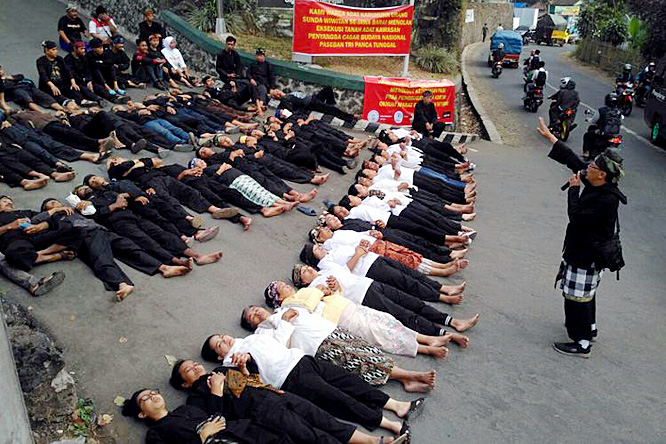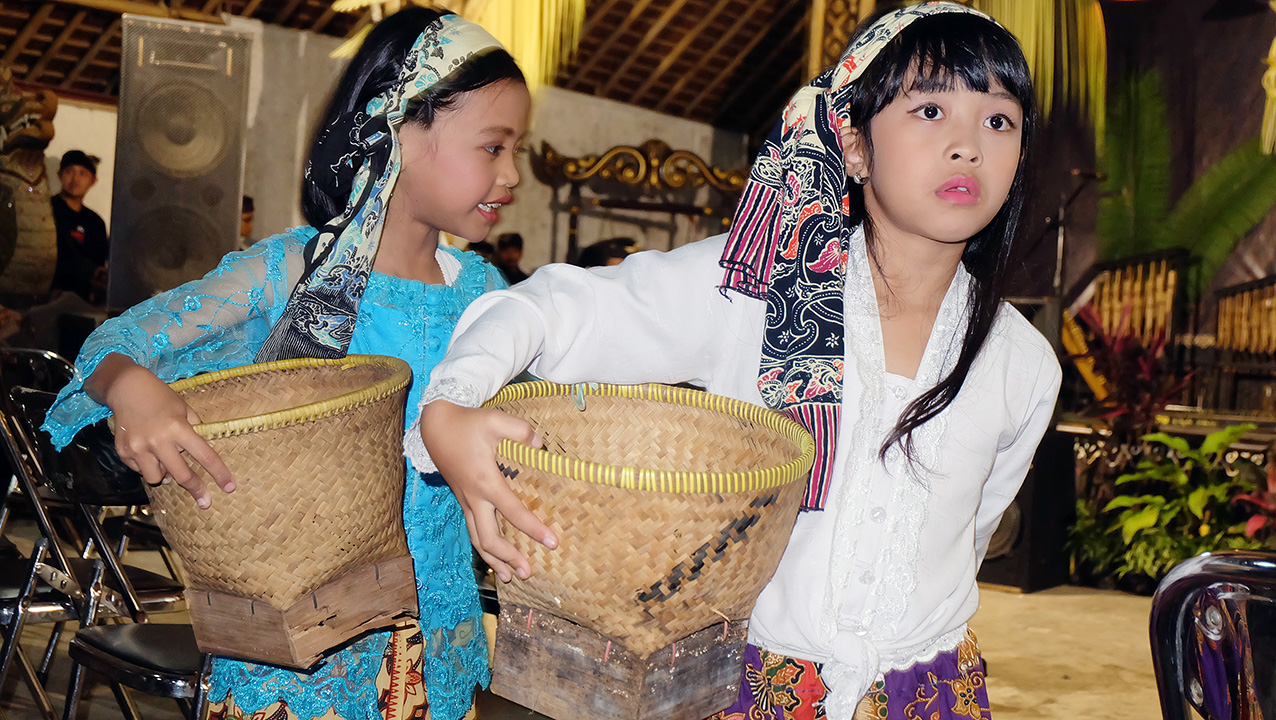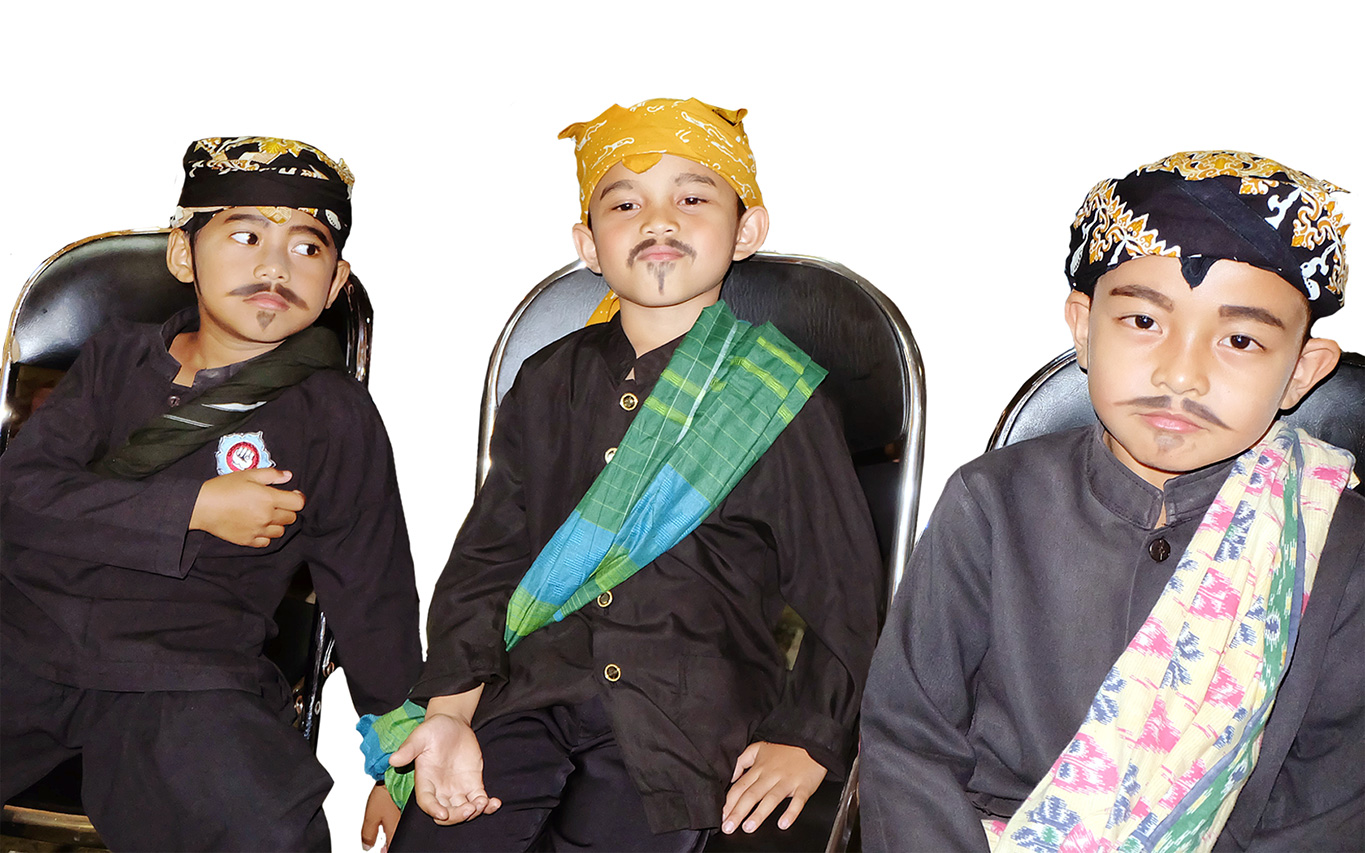Followers of Sunda Wiwitan, one of the countless indigenous faiths in Indonesia, have survived colonial oppression and purges
of non-official religions by the authoritarian New Order regime.
The Jakarta Post writer Corry Elyda takes a look at how the small communities scattered across West Java and Banten provinces
have stood the test of time.
Braving a night drizzle and chill, people from all walks of life flocked to Paseban Tri Panca Tunggal, an iconic cultural center of Kuningan, a hilly West Java town 245 kilometers east of Jakarta, for the ritual sacrifice of a cow.
After a while, the congregation proceeded to the iconic complex’s main building. Women were dressed in kebaya (traditional blouses) and batik while the men were clad in black uniforms and sporting the distinctive Sundanese hat.
That night’s main event was a mass service and sermon delivered by Prince Djatikusuma, the supreme leader of Akur Sunda Wiwitan Cigugur — the main sect of the Sunda Wiwitan named after the Kuningan enclave — a local faith that retains a small but loyal following across West Java and Banten.
The whole ritual was a prelude to a series of intricate events celebrating the 185th birthday of Gebang Prince Sadewa Alibassa Koesoemo Widjaja Ningrat (1832-1939). Popularly called Madrais, the prince not only reformed but also propagated Sunda Wiwitan, which is said to be as old as the country’s second-largest ethnic group. Raised in a Muslim royal family as Muhammad Rais, the prince blended the Sunda Wiwitan with other religious faiths into a new one called Agama Djawa Sunda that had subsequently been refined and renamed by his successors to survive government repressions.
”In the Sundanese language,
wiwitan means original or beginning.
In ancient times, the land making up present-day
West Java and Banten was known as
the “Land of Sunda”.
For outsiders, the ceremony looked like a routine cultural event. Devout Muslims regard Sunda Wiwitan as heretical but believers embrace it as a religion and a way of life that already existed long before the advent of “mainstream” Islam and Christianity to the archipelago.
Being the local Sunda Wiwitan monastery since the 1830s, the Paseban Tri Panca Tunggal building was preserved as a National Cultural Heritage site in 1976. Now, its future is uncertain after Supreme Court in Jakarta ruled in favor of a descendant of Madrais who lays claim to the Sunda Wiwitan’s communal land as his personal property and wants to rebuild it as an eatery.
Akur Sunda Wiwitan is one of the spiritual movements practiced by the Sundanese. In the region, there are other less well-known native faiths such as Kanekes or Sunda Buhun. Sunda Wiwitan along with several other indigenous faiths from other regions came into the spotlight thanks to their years of tireless struggle to get state recognition, which succeeded last year.
Like other local religious beliefs, their teaching is centered on nature. They believe in Sang Hyang Tunggal (the oneness of God), also called Sang Hyang Karsa (the Most Powerful). Believers are taught to have the utmost respect for fellow human beings and nature. Stealing, drinking, killing and lying are strictly taboo.
“Any misdeeds that can spoil humanity are prohibited,” Dewi Kanti Setianingsih, a faith freedom activist and grand- granddaughter of Madrais, said.
Their best-known ritual is probably the annual harvest revelry Seren Taun, which captivates locals and avid cultural avocados from other regions alike. Adherents meditate twice a day facing fire or stove, at dawn and dusk.
Fire or light symbolizes enlightenment. “Fire is the medium for us to pray to God,” said Dewi, who is daughter of Djatikusuma.
Some misunderstand the use of fire in the ritual, thinking that Sunda Wiwitan followers worship fire. Dewi, who prefers to call her community the Karuhun community, says that it is just like Muslims who encircle the Kabah during the haj pilgrimage; it does not mean that they worship the stone.
Although the belief system is as old as the Sundanese ethnicity, the adherents remain subject to discrimination as described by Rian Sutarman, a 25-year-old resident of Ciamis.
“I had no friends in my first year in junior high school although I behaved well. They thought my religion was heretical,” he said. Things eventually changed for the better although people would still frown whenever they heard his religion uttered.
Despite such discrimination, Rian has refused to covert to another religion. “This is my and my family’s way of life. I do not want to change religion.”
Incredible figures
There is no official number of Sunda Wiwitan followers in Indonesia. According to Dewi, at least 400 families identify themselves as adherents in Kuningan but she has sketchy information about those who live in other regions across West Java and Banten.
The Cigugur Population and Civil Registry Agency has recorded 447 people who embrace various local faiths, 94 of them being Sunda Wiwitan.
When the state still refused to recognize local faiths, the agency duly registered their believers but left the religion space in their ID cards empty.
To avoid complications, they would randomly choose one of the six official religions: Islam, Protestantism, Catholicism, Buddhism, Hinduism and Confucianism. Interestingly, Sunda Wiwitan and other local belief systems remain unknown among the Muslim majority.
Padjajaran University historian Widyo Nugrahanto said the propagation of Sunda Wiwitan as a spiritual movement was started by Madrais following a revelation.
Widyo, who has traced back Sunda Wiwitan history as far as the Netherlands, says the number of Sunda Wiwitan followers amounted to 10,000 in the 1940s. “It was a huge number then given that the archipelago’s population was still around 70 million. Therefore, the Dutch and Japanese colonial administrations considered it a threat,” he said.
As propagators of the faith, Madrais and his descendants avoided confrontations with the colonialists but they instilled nationalism in their followers instead. “They believe in motherland, meaning that they believe in the land on which human beings live. It’s akin to nationalism in religious terms,” he said.
Survival tactics
Sunda Wiwitan as a community and spiritual movement has been subjected to oppression since colonial times. Suspicious that Madrais entrenched nationalism in his followers, the Dutch exiled him to Papua and sent him to a sanatorium in Bogor. The Japanese banned local spiritual movements to win the hearts and minds of Muslims they needed to help them on the frontlines.
After his death in 1939, Madrais was succeeded by one of his sons, Tedjabuana Alibasa Kusuma Widjaja Ningrat.
During the military purge of communists following the aborted coup of 1965, many adherents of indigenous faiths were accused of being communist and killed. But Sunda Wiwitan followers survived the massacre because Tedjabuana and his followers had converted to Catholicism in 1964, fulfilling the prophecy of his father about the tragedy that claimed hundreds of thousands of lives across Indonesia. They reconverted to Sunda Wiwitan when order was eventually restored.
“When he [Tedjabuana] converted to Catholicism, most Cigugur residents followed his step and when the massacre happened in 1965, they were spared,” Widyo said. And the success was replicated by numerous native faith followers in Central Java and East Java.
Traces of the conversion en masse are still visible today with the presence of Catholic churches in the predominantly Muslim Kuningan. Dewi Kanti acknowledged only the exceptional few would risk their civil rights sticking to indigenous religions like Sunda Wiwitan.
According to Widyo, Catholicism became a popular choice because Tedjabuana had good relations with Catholic politicians and his doctor was a Catholic. The Soeharto regime did not recognize native faiths, believing that only mainstream religions would serve as the most effective means of stopping communism. Citizens who refused to convert to one of the official religions could be labeled as communists. At the height of the 1965–1966 purges, they were subject to arbitrary killing by the state security apparatus and vigilantes.
During the Soeharto regime, Sunda Wiwitan rituals were banned and followers put up no resistance to show the peace-loving nature of their religion. In 1980s, Sunda Wiwitan believers were officially banned from holding Seren Taun, an annual rice harvest ceremony to pay respect to Nyi Pohaci Sanghyang Asri, the rice goddess. In the ritual, farmers took home their harvest and pounded the grains in mortars while singing.
“Because we were not allowed to pound rice grains and sing, we did the ritual by manually peeling the grains,” Dewi said. The celebration was revived in 2006, eight years after Soeharto’s downfall, and now it has become an annual cultural event in Kuningan.
Sunda Wiwitan followers do not propagate by coercion of any sort and give their children the freedom to embrace any religion of their choice. Mimi Sudarmi, a 57-year-old grandmother from Garut, said her family had been practicing Sunda Wiwitan for a generation but her family was fine with her daughter converting after marrying a Catholic.
Another believer, 35-year-old Ugan Suganda, married a Muslim girl. “My in-laws asked me to convert to Islam for easy access to a civil service but I chose to stick to my [Sunda Wiwitan] religion and my wife remains a Muslim.”
Last year, the Constitutional Court in Jakarta made history when it ruled that the state should recognize indigenous religions like Sunda Wiwitan and that followers should regain their civil rights. If properly enforced, the ruling, which is disputed by conservative Muslim groups, could be a new dawn for the followers who have long been stigmatized and deprived of their basic rights.
 Peaceful fighters: Followers of Akur Sunda Wiwitan Cigugur form a human barricade to prevent police and public order officers from seizing a building in their monastery in Kuningan, West Java, on Aug. 24, 2017. (Kompas.com/Muhamad Syahri Romdhon)
Peaceful fighters: Followers of Akur Sunda Wiwitan Cigugur form a human barricade to prevent police and public order officers from seizing a building in their monastery in Kuningan, West Java, on Aug. 24, 2017. (Kompas.com/Muhamad Syahri Romdhon)
Native faith followers on the brink of losing communal land
Adherents of Akur Sunda Wiwitan Cigugur in West Java have always embraced a way of life that upholds the principles of humility, peace and harmony as their most fundamental religious values. But when the local district court mobilized some 500 police and public order officers last August to help an individual assert his claim over a plot of communal land on the back of a court order, they fought back.
Along with people sympathetic to their cause and willing to support them in defense of their rights, hundreds of men and women formed a human barricade and vowed to fight ‘’to the last drop of blood’’. The police retreated but the Sunda Wiwitan community’s fear of losing their collective property lingers to this today because the court officials said the seizure attempt was only postponed indefinitely to avoid clashes that would complicate the dispute.
The iconic complex was the birthplace of the Akur Sunda Wiwitan Cigugur. Now it also serves as a cultural center and museum. Its historic religious significance is so meaningful for Akur Sunda Wiwitan that it is probably comparable to that of Jerusalem for the Abrahamic religions. The Paseban was where Prince Madrais settled after his father’s Gebang kingdom in Cirebon, 35 kilometers to the north, was overrun by rebels backed by the Dutch colonial power. Here in Cigugur he started a strain of the ancient Sunda Wiwitan in the 1930s.
Until today the complex houses Madrais descendants from his two wives and retains its function as the sect headquarters. The Akur Sunda Wiwitan Cigugur incumbent chief, Prince Djatikusuma, also resides there. However, over the course of time some of the descendants became embroiled in internal bickering over Madrais’ material inheritance.
At the center of the dispute is a 224-square-meter plot that is part of the Sunda Wiwitan paseban, or monastery, Tri Panca Tunggal, which the Education and Culture Ministry designated as an item of cultural heritage in 1976. Standing on the disputed parcel of land is a house that was built for the late E. Kusnadi, an expert hired as an advisor to the community.
In the ongoing legal drama, the protagonist is Djaka Rumantaka, a great grandson of Madrais from his first wife, Queen Siti Djenar. He laid claim to the part of the property as his mother’s heritage in 2008 and the Kuningan District Court ruled in his favor two years later. Since then the Sunda Wiwitan community has lost an appeal in the West Java High Court, in 2012, and a cassation with the Supreme Court, in 2014.
In an interview with Koran Tempo, Djaka, who lives in the neighboring town of Sumedang, said he wanted to tear down the disputed property and build an eatery “to feed the hungry mouths of Madrais’ offspring”.
The court ruling erupted into controversy because judges argued that the Indonesian legal system did not recognize the concept of communal property that the Wiwitan community — and various other customary communities in the country — has cherished for centuries. The court only recognizes inherited property.
The legal battle over Sunda Wiwitan ancestral land has ramifications way beyond an ordinary civil dispute over land ownership, which are common throughout the archipelago as a result of the chaotic legal system. For instance, the 1960 Agrarian Law acknowledges customary traditions. The ruling highlights the state’s discrimination against indigenous faiths and minority groups.
Dewi Kanti Setianingsih, Madrais’ great-granddaughter, well known for her faith-freedom activism, says the Madrais offspring adopted customary traditions for generations without problems until the court arrived at the disputed ruling. In media interviews, she recalled judges disregarding testimony from Sunda Wiwitan adherents apparently because the faith was not recognized as a “religion” as the court system understood it. The standard court procedure requires that every witness take an oath in the name of their respective religion.
The Akur Sunda Wiwitan Cigugur community is afraid that the court ruling, if it goes unchallenged, will set a bad precedent for other native faiths and numerous customary communities alike. The end game will be that the people will be uprooted from their ancestral land for good.
Although the Supreme Court has seemingly closed the legal avenues, the battle is not over yet. Last year, Prince Djatikusuma and community leaders filed a lawsuit against the ruling, which was based on the judges’ opinion that the case was a dispute over inheritance. In their suit, the plaintiffs aim to convince that the case was a dispute over traditions.
Today, the community counts on the support of like-minded civil society groups and the National Commission on Human Rights (Komnas HAM). The Indonesian Communion of Churches has also come forward in its defense. Critics have condemned the court ruling as unfair, overly formalistic and lacking the humane aspect of justice.
The court ruling was the heaviest blow for the community after the 1965 communist purge, which saw followers of unrecognized indigenous religions targeted as being sympathetic to communism. It will be interesting to see how the 2017 Constitutional Court order for the government to recognize native faiths will play out in the Sunda Wiwitan saga.
 Offerings to Mother Nature: Girls take part in an Akur Sunda Wiwitan ritual. Farmers make up the majority of the indigenous faith’s following in rural areas of West Java.
Offerings to Mother Nature: Girls take part in an Akur Sunda Wiwitan ritual. Farmers make up the majority of the indigenous faith’s following in rural areas of West Java.
Its teaching centers around the relations between humans and nature.
| Reporter | : | Margareth S. Aritonang |
| Managing Editors | : | Primastuti Handayani |
| Desk Editors | : | Pandaya, Imanuddin Razak |
| Art & Graphic Design Head | : | Budhi Button |
| Technology | : | Mustopa, Sandy Riady Hasan |
| Multimedia | : | Bayu Widhiatmoko |


